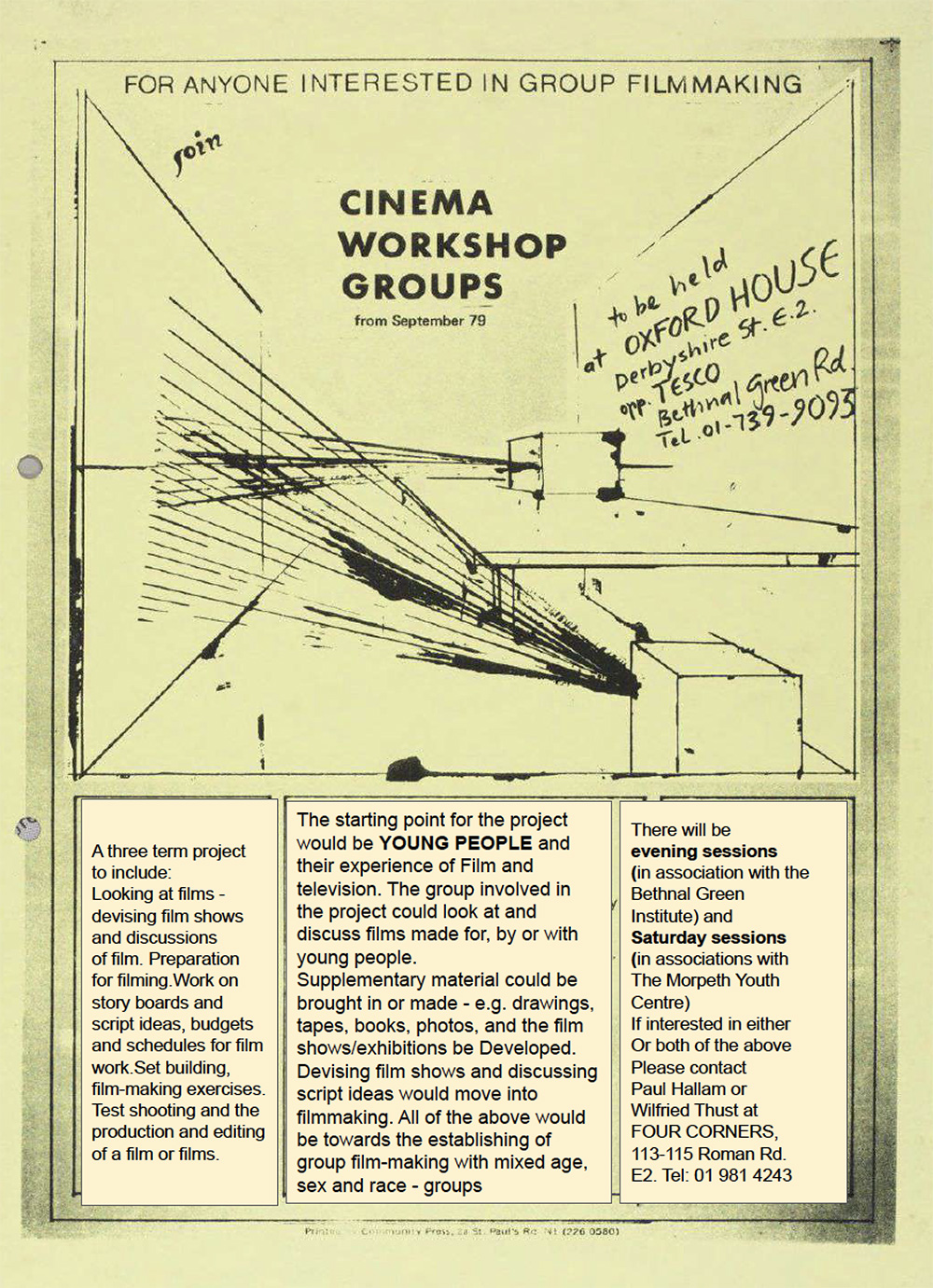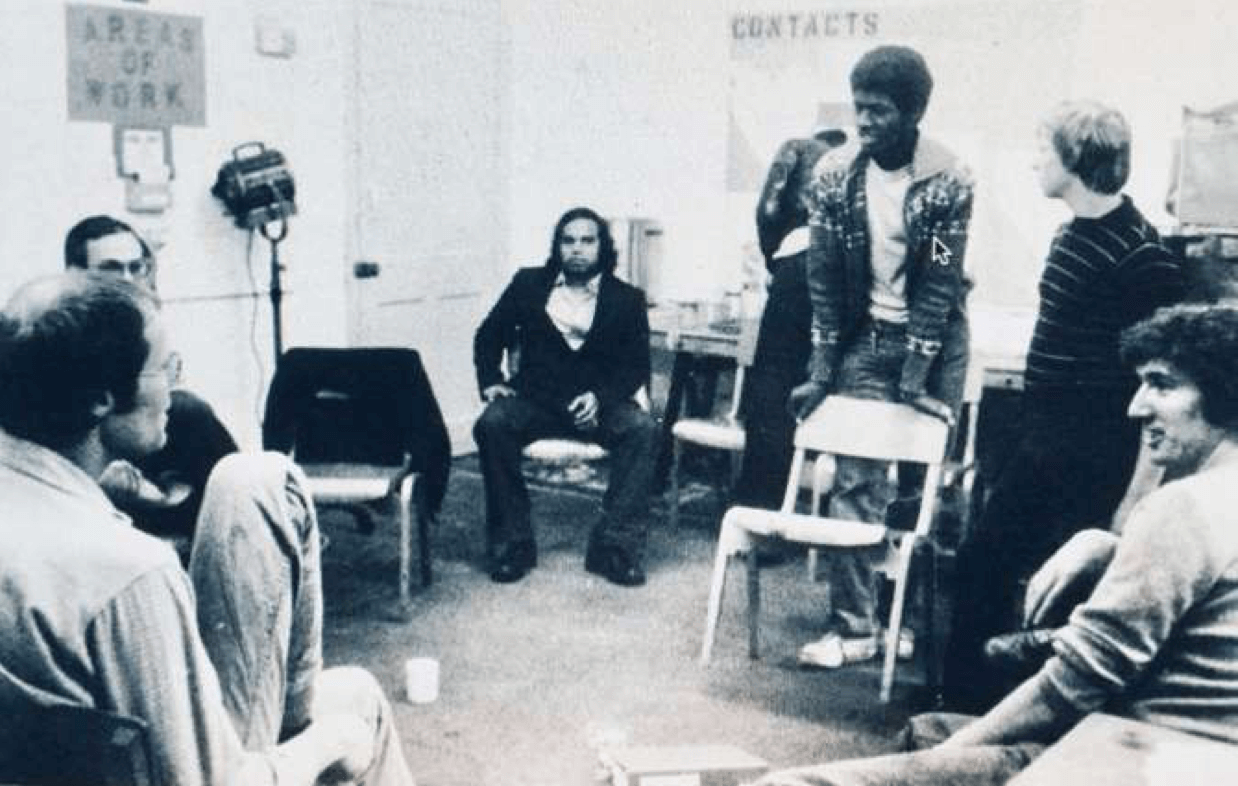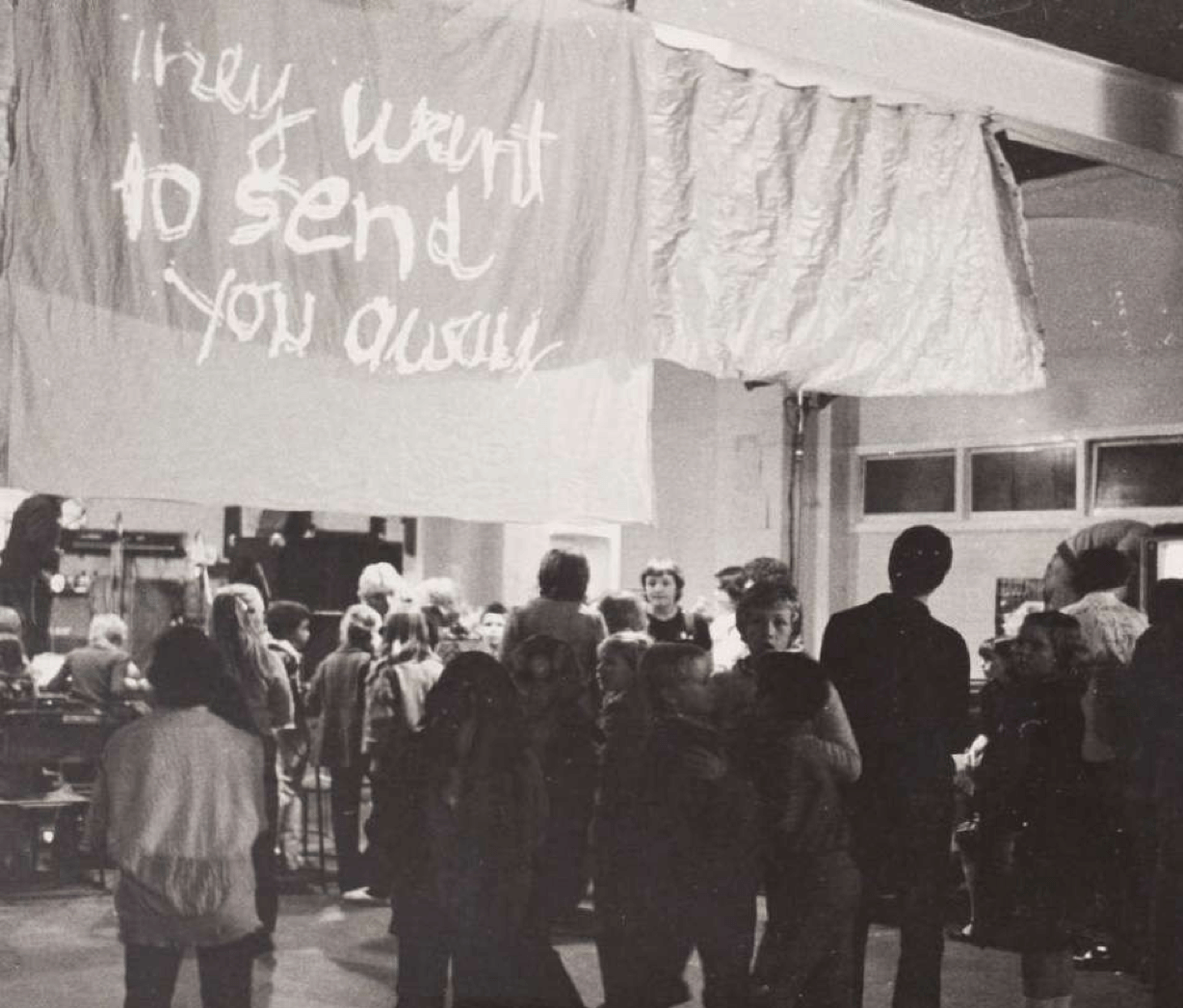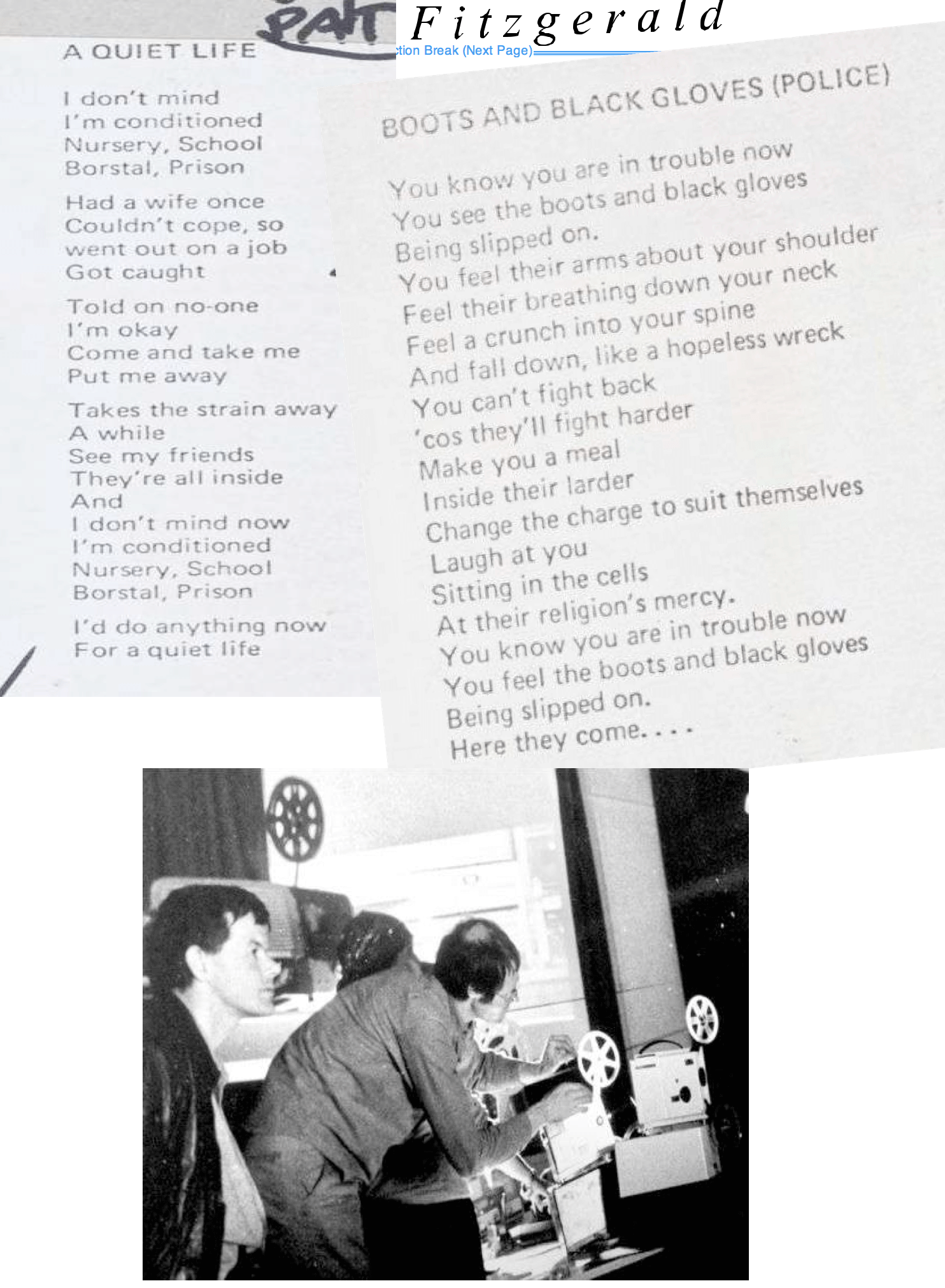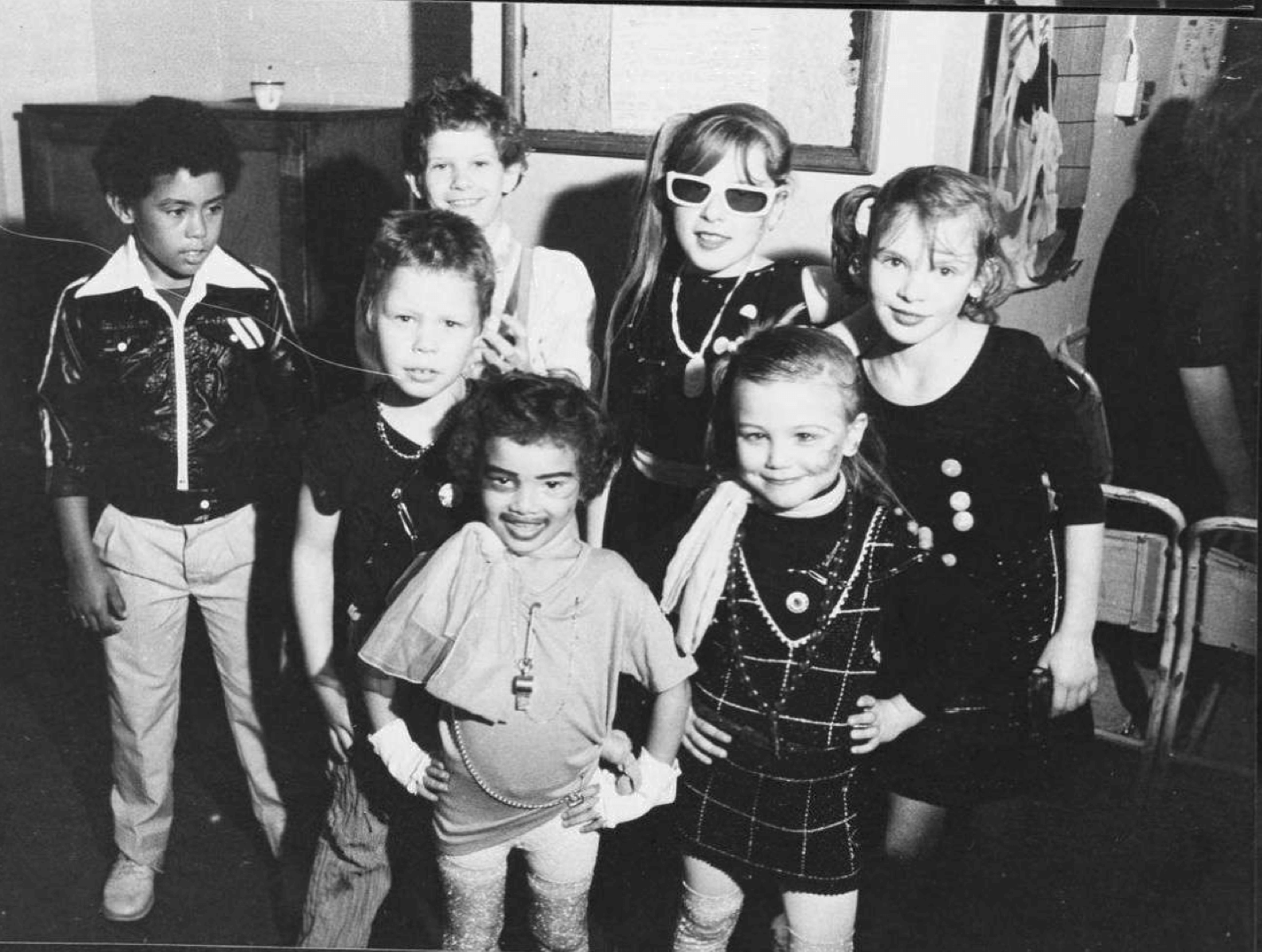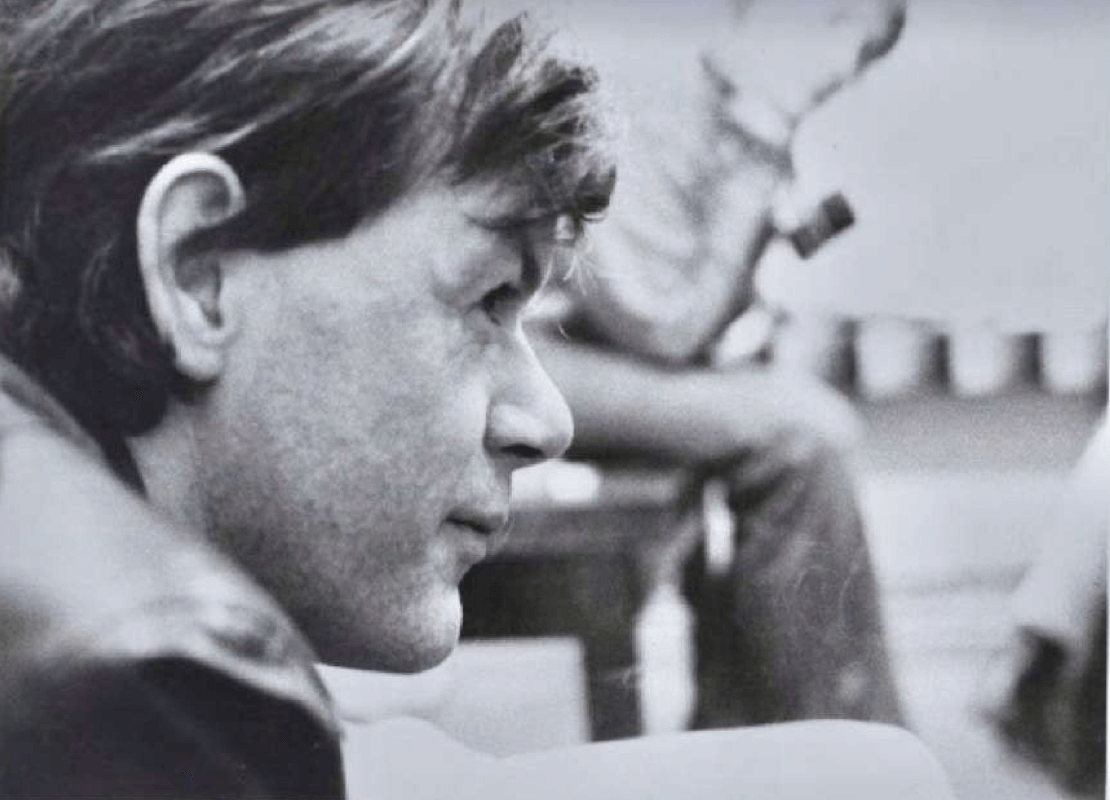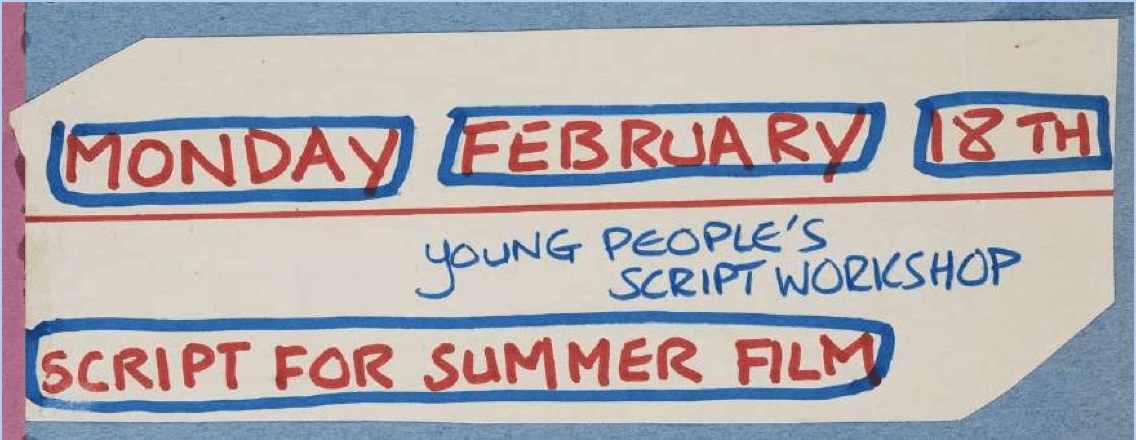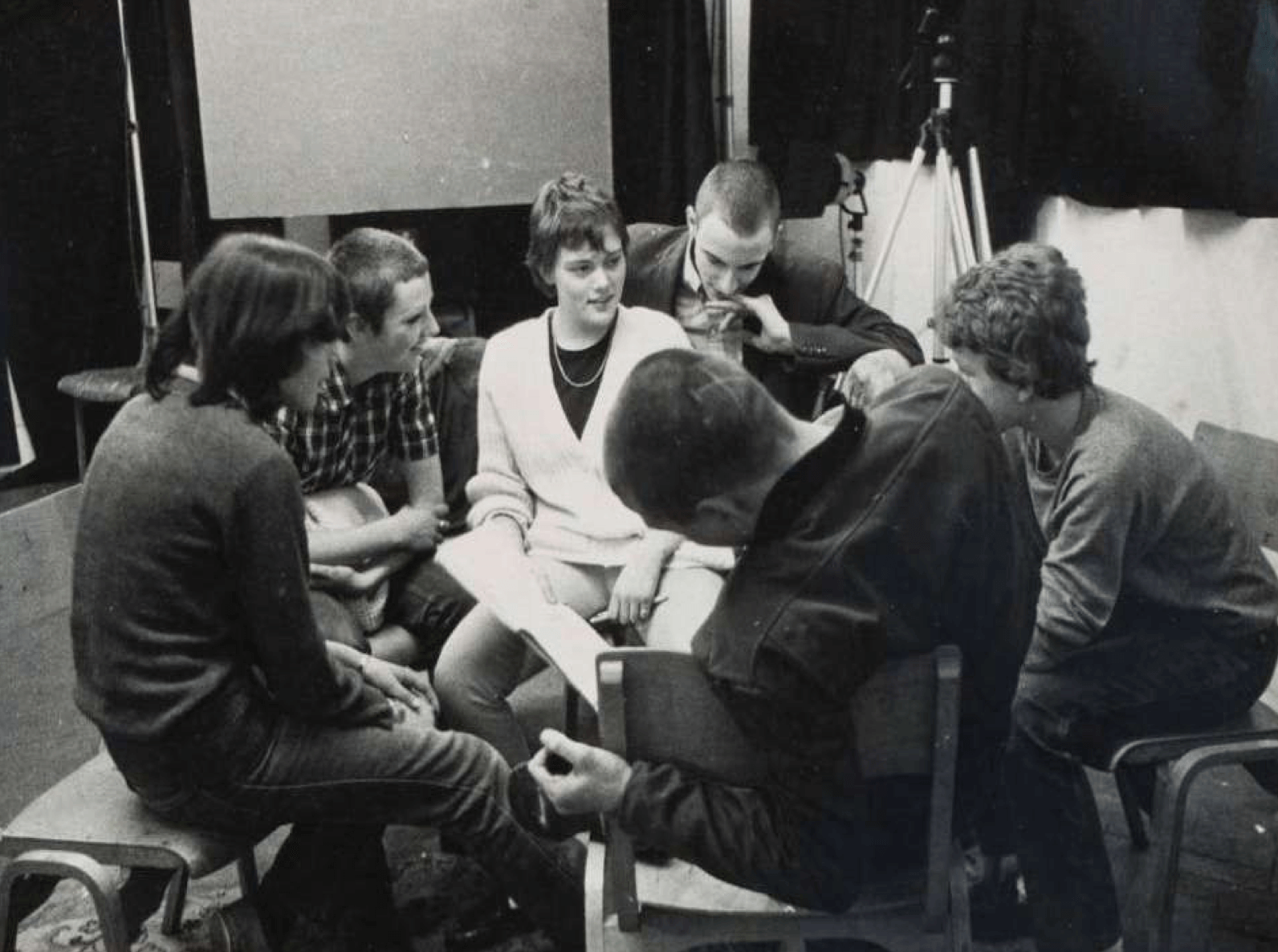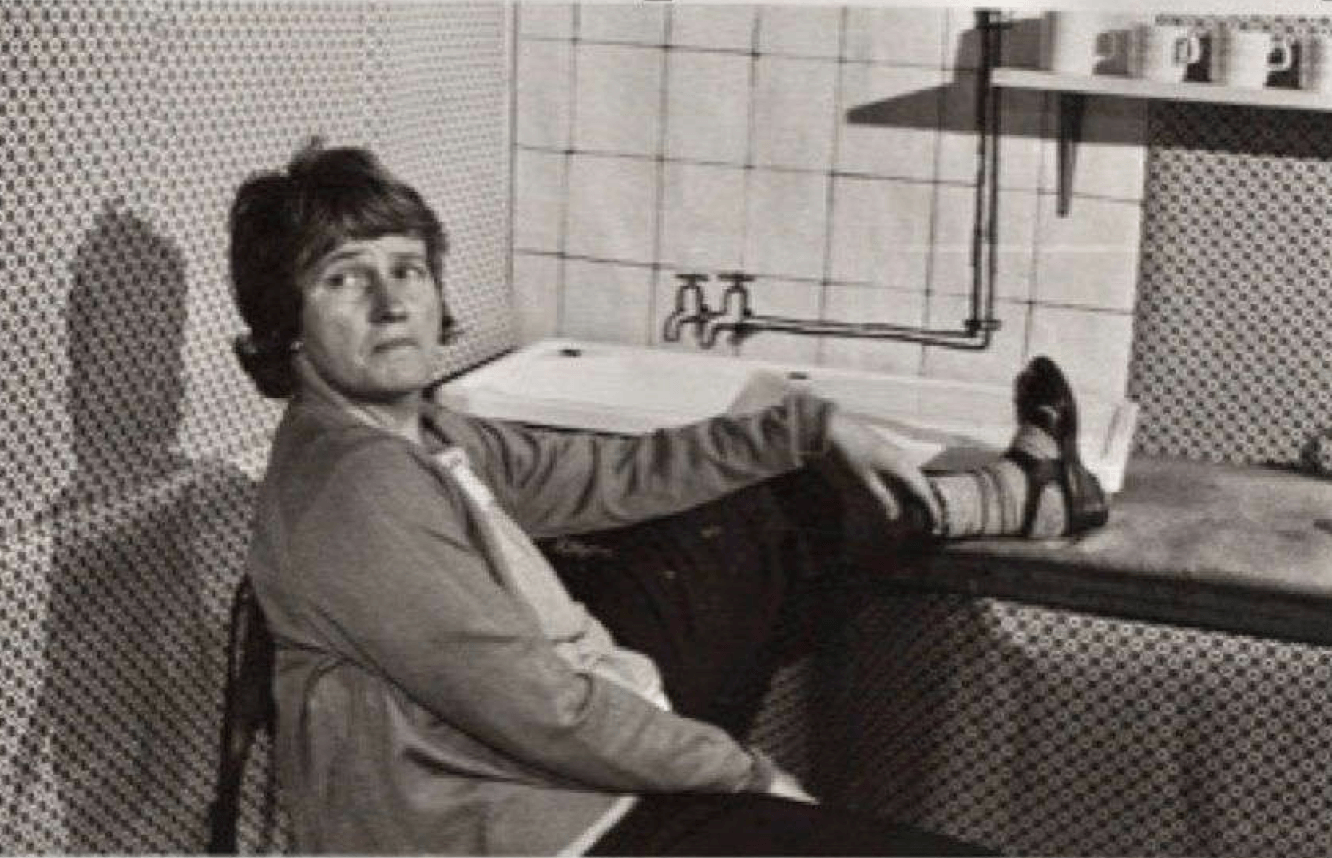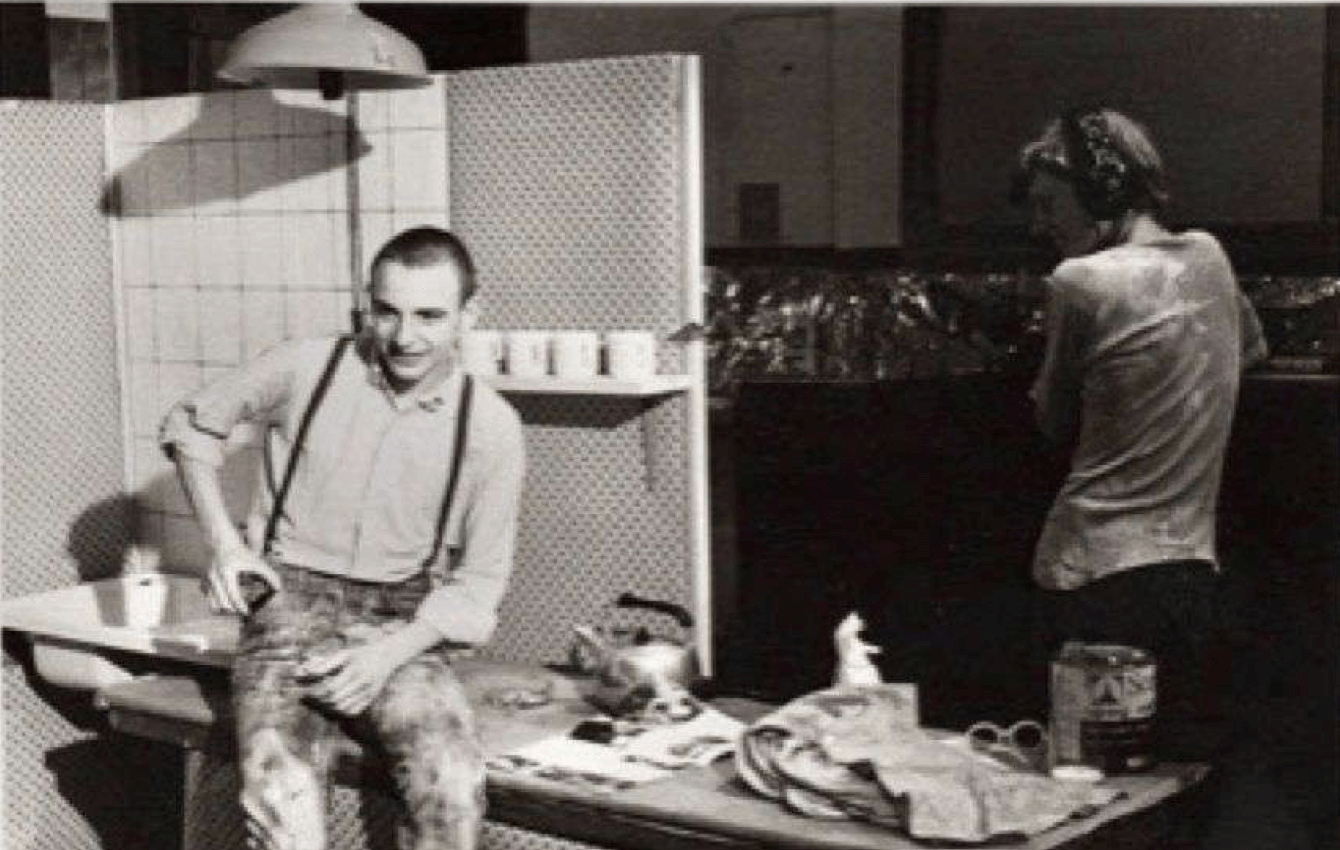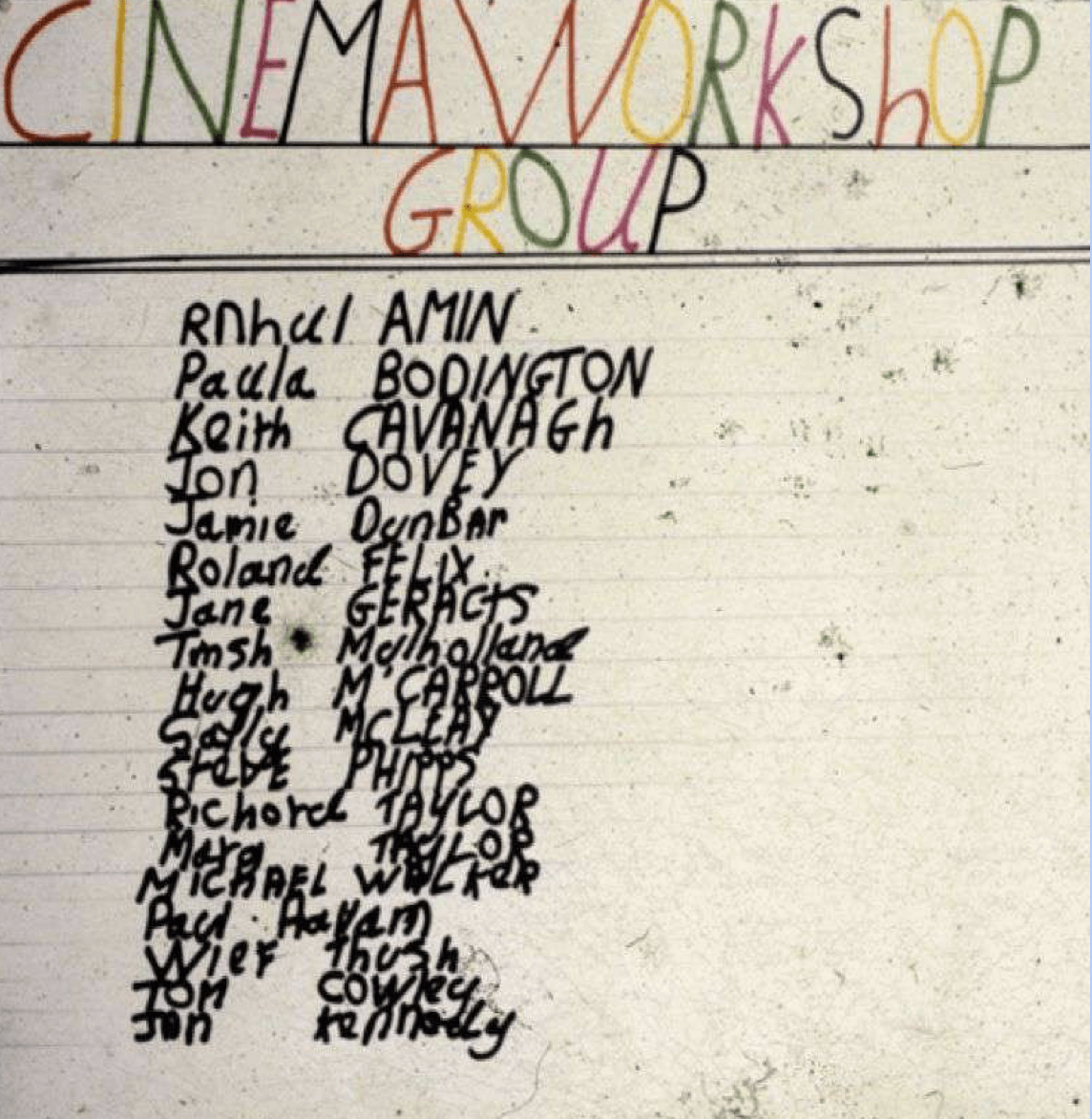The Young People
Cinema
Workshop
1979/80 as part of Four Corner Films
It is astonishing to me to read the poster we did more than 40 years ago. Already it sums up not only all our intentions at the time but also all the practice we experienced from then on.
I had contacts in the arts community in Tower Hamlets and the Arts Committee, in youth clubs and in the local history libraries, and also with local people who in many different ways took an active part in supporting communities around us in Tower Hamlets. I felt the excitement of a newcomer. I felt empathy with the fate of immigrants in the East End of London but wanted more than merely study history. I also had to meet the ‘right’ people. I was particularly interested in teenagers, young people at that age of transition. I wished to meet not ‘educated’ but creative young people with an ‘edge’.
I read books on youth culture, magazines on schooling, poetry collections, newspaper articles and film reviews on young people, ‘Schooling and Culture’ magazines from the ILEA Cockpit Arts Workshop, the research by Paul Willis on working-class male youth And their resistance to being taught in school knowing that they would end up in meaningless jobs later in life, Chris Searle’s compilation on ‘The World in a Classroom’ and magazines like ‘Temporary Hoarding’ and more.
Tower Hamlets had a lot to offer in terms of progressive local activities
but there was also the hard reality of aggressive National Front reactions to immigration and social changes in the Borough. The Four Corners building was near pubs where NF members met and where hoardings with NF graffiti stood.
In 2018 I recalled this year long project in a book with 240 pages. It reveals basic QUESTIONS underlining our thoughts at the time and shows the methodology of this essentially pedagogic process.
This is not so much a story of success in my teaching efforts as a success in my intentions and direction, to work on changes within society in theory and in practise. This here is an overview.
For me it was to find out how much confusion, even elements of contradiction I could accept and allow myself to enjoy ?
This project carries the opposition to school that many of us feel.
It might be the invitation to – and longing for so many – to be taken seriously in their willingness to learn. Our project was
giving young people trust in personal experiences of Learning.
This sketch illustrates 4 main areas of concern, in our case with four guardians:
WILF to get it going, PAUL as script writer and communicator,
KEITH as technical support and camera man and
RICHARD as film editor.
All of us working as a group prepared to share necessary jobs.
I am grateful that
FOUR CORNERS in the 1980s
gave me the unexpected chance to develop MY way. I had stored up a lot of issues in the 70ties that I could not fulfil. Now I managed with a few applications to raise money for a project run in the way I felt close to.
Roland and Sally
West Indian born ROLAND appeared in Four Corners before expressing his like of photography. Here he is as one of the first young people coming with his two friends.
SALLY from Australia joined the workshop. She knew about Jo and Mary Pat’s film development about mothers and daughters in Bethnal Green. At that time she earned her money as an art supply teacher in a Bethnal Green secondary and later from there she managed to attract a group of pupils to join us.
Here is what I scribbled down two years later after talking to Roland who was still with us working on my film “IS THAT IT”
This slide projection came out of our workshop.
The texts were an attempt to capture moods of kids around us
– these moods – as we knew from our research – are real.
We found many suitable texts and words and scratched some onto slides.
Experiments of scratching film = celluloid slides appealed to me. It has been a quick, rough and effective methods for children to express themselves in a class room and darkrooms. The technique was also used by filmmakers of
THE LONDON FILM MAKERS CO OP at the time and in the so called “EXPANDED CINEMA” where the projectors became part of the Art of cinema.
Paul Hallam and me performing in a youth club.
NOTHlNGTO D0
There’s nothing to do round here
So we just take it out on other people
Nothing to do round here
So we go round writing on all the walls
No‹hin to do round here
So we smash up all the telephone boxes
Nothing to do round here
So we piss in the lifts and make them smell
Please sir, give us something to do
And then we’ll be okay
Please sir, give us something to do
And then we’ll be okay
But there’s nothing to do
Nothing to do
Nothing to do
Nothing to do
Smash you in the mouth
Smash your face
Kick you in the teeth
Take your money
ALL THE SPLATTERED CHILDREN
Children play up on the twelth floor
Walk along the balcony
Walk along a tightrope
And then they topple over
Splattered on the grass below
Like eggs inside a rubbish chute
Papers on the ground
And their parents crying
Angry at the people
Bitter towards the people
Swearing at the people
Who made them live in the sky
Ambulance and police arrive
Fire Brigade arrive too late
Still — they saved a cat
That got stuck up a tree
Walk past all the blocks of flats
Look at all the grassy lawns
You can see the stains there
From all the splattered children
P e r f o r m a n c e s
THE IDEA of our Cinema Workshop performing an “ACT”
with a group of young people to others and to perform “as we are” in conversations to and with others, came up when JO and MARY PAT two original members of FOUR CORNERS had already planned and booked the HALF MOON THEATRE EVENT they called
‘IN FRONT OF THE CINEMA’
We had the chance to join in with our interest to encourage small group activities and performances.
What we intended to contribute should not be particularly special nor should it be
geared to be “successful’”. We wanted to give a chance to the natural talents around us. And we encouraged them to perform and to overcome any inhibitions.
For me it was important to be PERFORMED that each member of our group felt accepted and well appreciated.
In preparation we started one of our first sessions in Sept 1979 with the film UP THE JUNCTION by
Ken Loads and Tony Garnett BBC – TV 16mm black/white
and went through the “STORY” of press cuttings. Then we tried to restage scenes ourselves later in Dec.
THAT SINKING FEELING by Bill Forsyth
What a cunning description of the mood of so many depressed young people.
This independent film involves non actors and was like a mirror of our own film making intentions.
What a treat to meet the director and the actors.
Paul here leading the conversation with Bill Forsyth on stage,
Richard Taylor and me next to him. For us this was an incredible success.
The camera also got a glimpse of the audience
.
And we invited comments ….
Paul Hallam working in a script session
This was the second part of our course and a fresh start to come up with a script that we wanted and could agree on, as these notes by Paul make clear.
POWER
Youth worker John Lancaster came along. He supported us in every way. Weeks later he helped with the creation of the music and a band in the CRYPT of the nearby church.
Paul Hallam in his diary notes on THE Y.P. CINEMA WORKSHOP wrote next to many other critical comments from
members :
Some people coming with expectations of learning in courses and classes say “Do you think people will get all this … are they really with you ?”
My answer was “Only if they respond to the structure, the content and the people the course offers or bring together…
I usually found it easier to talk when there were few of the adult members around. Being with the teenagers gradually affected the way I was talking. My language loosened a little – years of moving away from my background and into the middle class – being amongst a young and predominantly working class group brought many things back to me – my own experience of drama workshops outside of school, away from home and in the nearest city (theater workshops at Nottingham Playhouse), the complex experience of “culture” at that age, all the basic differences between the people I spend most of my time with and the young people struck me more and more.
Before one of the workshops events at the Half Moon I was in the pub with A few of the workshop teenagers. Michael was fresh from a brief skirmish With the police – he’d sending up one who was on horseback at the time.
One mention of the police tended to lead to a dozen others.
In the early days of the workshop the talking and mucking around was largely Amongst the teenagers themselves. Working on the half moon shows did seem to break this down a bit. We then moved onto script and video sessions, music workshops at the Crypt and a lot more bub visits. It finally seemed possible for at least a few of the adults to join in on conversations rather than Listen in, to join in and relax.
It is easy to forget just what young people are up against. We might be arguing about the best way to live ( on one’s own, in a couple, with a group of friends etc) – most of the kids have no option. They are stuck with parents, home and home rulebooks. Most of the kids get only handouts or badly paid Saturday jobs or they have to ask, beg, cadge or steel. We might wonder weather or not we are in the right job, working in the right kind of way.They are having to decide whether or not to stop on at schools they often don’t like or go for a badly paid job, apprenticeship or “training” scheme – if they can get any type of job at all. They might be joining the two million unemployed. They are going through exams , trying to get into colleges – and if they don’t get in trying to find an alternative. They are faced with a whole host of laws and restrictions which simply don’t apply to adults – and there are few cheap places they can enjoy being together in.
The workshop can at least help a bit on the latter.”
A lot of oppression simply comes up in everyday conversation. Someone will be talking about wanting a scooter – but they can’t afford it and anyway the law and or parents won’t allow them to drive. One of the girls might not be able to make workshop sessions – at least two of them have regularly to look after younger sisters and brothers. They don’t say much about it to me – but clearly a few of them have quite a rough time at home, or with their sex lives.
A response to a particular form of oppression (race, sex, that of young people) might be provoked by our showing a film, bringing in a particular tape
or picture – but often there is no need for such particular stimulus. There are arguments and discussions amongst them about race, sex, class – either surrounded by a lot of ordinary and playful conversation, or incorporated in it.
The workshop is I think primarily a place for those dialogues to take place and of finding ways of responding to them through film. But I am aware that the above simplifies and makes the workshops sound much drier experiences than they actually are.
Paul Hallam and Anthony Davies between boys of the workshop.
Back PROJECTIONS allow images but also texts, voices and sounds to go with it. That brings us back to earliest film experiences. I used a torch, hands and slides with my brothers in bed as a child. It was good fun and still is used even today in our families shadow theatre plays behind bed sheets. There is something simple and magic about this.
I THOUGHT THIS SPACE WAS IDEAL FOR A SET OF A STREET WITH BUILDINGS ON EITHER SIDE ALONG ETHNAL GREEN ROAD.
Look at the building and the ground plan here as inspiraton.
Other drawings appeared FROM SOMEBODY IN THE GROUP and I don’t know whom from.
They were certainly strikingly blunt. I like them. I even used them on a poster. The press turned up and asked me about it. I managed to argue my way out.
Ruhul had very ambitious ideas about his future
Ruhul had very ambitious ideas about his future
